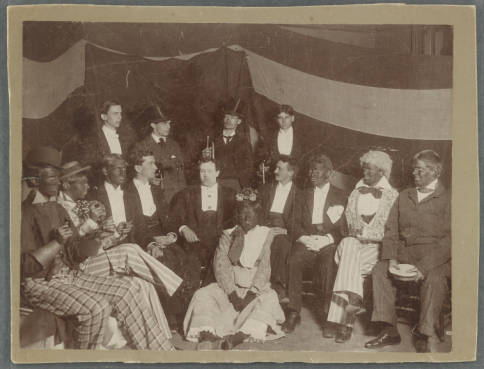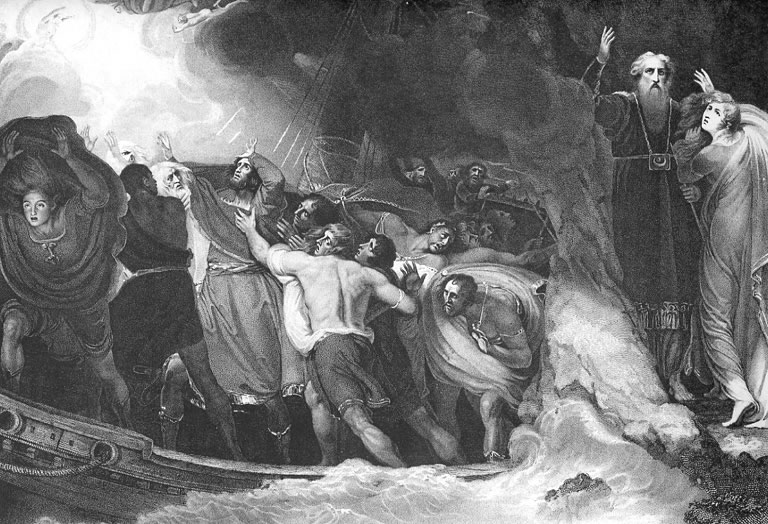When readers’ eyes confront the homogenous sheets of a Shakespeare manuscript, any actor would insist that the sheer words flatten the fullest potential of the plays. At best in a perceptive reading, shadows of tones emerge as rhetorical implications.. The critical eye, as a holistic overarching consciousness often prefers to gravitate to rhetoric, images, and themes. The characters aren’t as much individuals as tropes, or fragments subsumed into a whole. But an actor/actress, whose entire vocation depends on a single character, can afford no such flexibility. Any indecision will shout mediocrity to the keenly peering audience. Absorbing this more demanding interpretation can be rewarding to literary readers who never plans to must the gall to step on stage. To this end, actor Phillip Voss’ award-winning essay on his role as Prospero in The Tempest is a particularly fine example for this exercise. Continue reading
Tag Archives: Prospero

Caliban and Sambo
At the height of the American Civil War, the debate on slavery raged in the American North and South. The North supported the abolition of slavery whereas the South wanted to keep the institution of slavery to sustain their plantation-centric economy. Where Shakespeare’s The Tempest enters the fray is with a political cartoon published at the midpoint of the war: January 24, 1863.
Shakespeare in the Park’s The Tempest
The last theater production I saw was in fact, the Shakespeare in the Park’s version of The Tempest. It was a boiling hot, incredibly humid June evening when we stumbled into the Delacorte theater in the middle of the park, ready for some culture. For a first viewing of Shakespeare’s debatably last play, it was a dramatic setting. The air, heavy with moisture made the audience feel as if they were truly sitting on a desert island. It was the best and worst part of the production.
(Post) Colonized Caliban
Recent scholarship has begun examining the relationship of Caliban and Prospero through the lens of postcolonialism, leading to a discourse that explores this relationship as analogous with that of the colonized and colonizers. This argument aligns Shakespeare’s work in the context of history, applying it directly to actual events. This allegorical reading explores the nuances of Caliban being abused by Prospero after introducing him to the island and the way that aspects of physical abuse and use of language work in ways to oppress Caliban as parallel to that of European powers colonizing Africa and the “New World”. Continue reading
Compositional Analysis of Romney’s “Tempest”

The shipwreck in Act I, Scene 1, after George Romney. Engraved by Benjamin Smith
In 1790, George Romney received a commission to paint the first act of The Tempest. Although the finished painting has apparently not survived, a 1797 engraved copy of the work by Benjamin Smith as well as multiple preparatory studies of the work are readily available on the Internet. Continue reading

Guess Who’s Coming to Dinner?
Well, it’s not exactly an angel…
In Shakespeare’s The Tempest, after being shipwrecked on an island, Antonio, Sebastian, and Alonso seek food and shelter. Unbeknownst to Alonso, his two followers seek to murder him in his sleep, eager to increase their own political power. Stumbling across a banquet full of food placed by invisible spirits , the travelers sit down and begin to feast. Out of the blue, a harpy (a female monster with a human head and a bird body), crashes their treat-laden party by landing on the table and castigates the villains for their terrible deeds. Continue reading

No Patriarchy, Please
Film Comment calls it Julie Taymor’s “own yonic paradise” – yonic, if you didn’t know, being the female version of the word ‘phallic’. Powerful and feminised, Taymor’s The Tempest is revolutionary if only for its female version of Prospero—or rather, Prospera, played by none other than Dame Helen Mirren. Continue reading
Narrative and the Plantation Colony
What are the plantations of The Tempest? Plantation, as defined in Shakespeare’s time, referred to the literal cultivation of the earth—to the creation of a colony on conquered land—and to the sowing of an idea, a belief system: a narrative.

Imagine The Tempest
Imagine the tempest… not Shakespeare’s play itself, but the actual storm described. Do you imagine a dark, chaotic scene filled with powerful, crashing waves? Do you see sailors scurrying around, trying to keep the ship from sinking?

